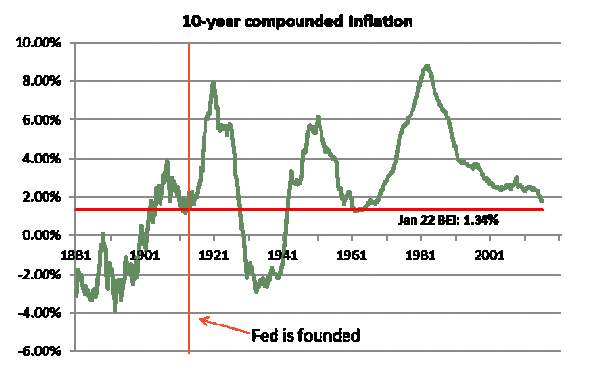Yesterday I presented our 2016 inflation forecast to the investment committee for a multifamily office, and when I was putting the presentation together I developed one slide that really is a must-see for investors, in my opinion.
For some time, TIPS (Treasury Inflation Protected Sercurities) have been too cheap. Really, it has been more than a year that our metrics have shown inflation-linked bonds as not just cheap, but really cheap compared to nominal bonds. I don’t mean that real yields will fall – so this isn’t a statement about whether I am bullish or bearish on fixed-income. Frankly, I am somewhat conflicted on that point at this moment.
Rather, it is a statement about what sort of fixed-income instruments to own, for that part of your portfolio that needs to be in fixed-income. If you are running a diversified portfolio, then you can’t really avoid owning some bonds even if you are bearish on the bond market. For risk-reduction reasons if for no other, it makes sense to own some bonds.
But you don’t have to own fixed-coupon nominal bonds (or, for that matter, floating-coupon nominal bonds which are still exposed to inflation through the principal of the instrument). In fact, right now it is hard for me to imagine betting on nominal bonds for the portion of my portfolio that is in fixed-income.
A picture is worth a thousand words, so here is the picture:
The chart shows rolling, compounded 10-year inflation rates for as far back as we have reasonable data. And it shows the current level of 10-year inflation “breakevens.” What this means is that if you are long Treasuries, rather than TIPS, you will do better over the next ten years if inflation is below 1.34% and above roughly zero. If we have big deflation, TIPS will do just about as well since they are also principal protected; if we have any inflation over 1.34%, TIPS will do better.
And as the chart points out, since the Fed has been formed we have literally had almost zero 10-year periods in which inflation was in the 0-1.34% zone. Perhaps the 10-year periods ending early in the Great Depression, en route to big deflation, or coming out of the Great Depression heading into WWII. But otherwise, inflation has always been either higher or, in a Fed-screw-up scenario, much lower.
Put another way, it means that if you choose to own nominal bonds instead of inflation-linked bonds for the next 10 years, you are short a straddle on inflation, and you’re not being paid much to be short it. (Technically, you’re short a zero-cost ratio call spread since you don’t lose in deflation, but I’m trying to keep it simple!)
There may be tactical reasons to prefer nominal bonds to inflation-linked bonds. But to me, there is no clear strategic reason to be long nominal bonds for that portion of your portfolio that you intend to keep in fixed-income.

